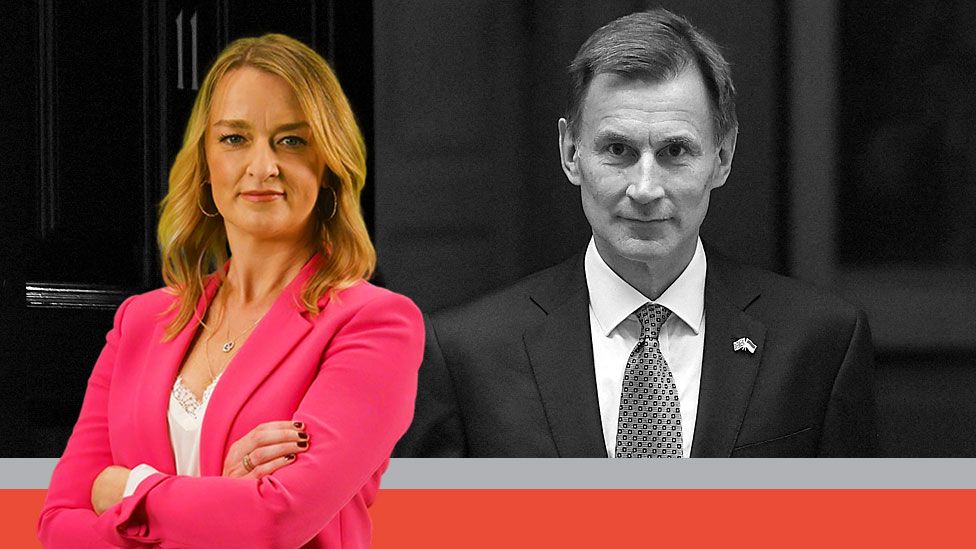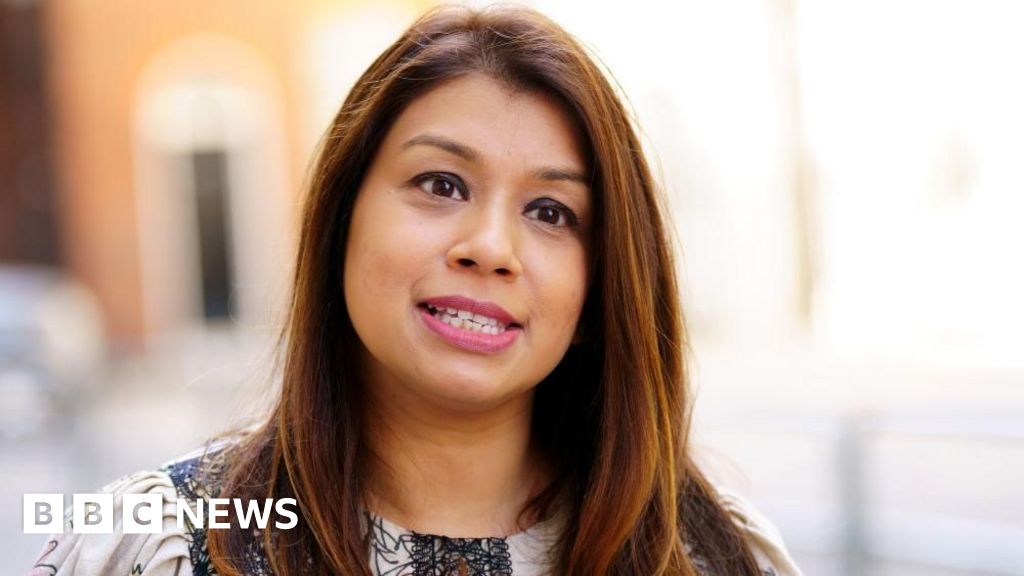ARTICLE AD BOX
 Image source, BBC/Reuters
Image source, BBC/Reuters
By Laura Kuenssberg
Presenter, Sunday with Laura Kuenssberg
In normal times (remember them?) there would be a frenzy this weekend about what's coming up in next week's Budget.
If it feels a bit muted so far, that isn't just because of a bit of a media frenzy over something else (what could that be?) but because Jeremy Hunt was employed as a "calm down" chancellor - called in like a soothing manager of many years' experience in a sensible bank to sort things out after some crazy young guns spent all the loot.
Given how he got his job and his political character he's not going to wake up on Wednesday morning and spring a red box full of massive shocks on an unsuspecting public.
One senior Conservative MP is hopeful of a few "pleasant surprises" but notes the Downing Street neighbours' priority is to "hold on to their reputation for caution and prudence".
Expect headlines about the country being less in the red than expected, a possible giveaway on pension savings and some goodies to help working families with the soaraway costs of childcare - you can read Faisal's primer here.
But when we sit down on our programme this Sunday with Jeremy Hunt and Labour's Rachel Reeves - who hopes to fill his job - there's so much more than the specifics of what's coming on Wednesday to talk about.
No one Budget can mask some big shifts in how the economy works - or perhaps doesn't work for many voters. Long-term changes to wealth and wages feed into how we all vote.
Statistics in the last few days suggest the economy is not in such dire straits as predicted a few months ago, but what's happened over the past few years and is possibly coming next isn't pretty.
Bluntly, the economy has failed to grow persuasively for a long time, and no strong surge is coming soon. In fact, the Bank of England reckons growth will be measly in the coming years too, only getting back to the levels it was at before Covid in 2026.
Politicians aren't short of explanations for what's gone wrong - some self-inflicted, some out of their control.
There has been the Ukraine war, the pandemic and the disruption of Brexit. We've also seen years of political strife, the markets' disastrous reaction to Liz Truss' decisions, the effects of a spending squeeze during the 2010s and even the long-lasting hangover from the 2008 financial crisis. Remember experts brandishing "L-shaped" graphs during that time - warning that it would take years for the economy to climb back to anything with vigour?
Those political and economic dramas have had real-life consequences, presenting huge challenges to what, years ago, politicians presented to voters as normal, achievable aspirations - the hope and expectation that each generation would do better than the last. Perhaps that's shaky now.
Take for example this statistic from the Institute for Fiscal Studies: in 1997 more than 60% of people on middle incomes between the ages of 25 and 35 owned their own homes. Twenty years later, that figure had slumped to just over 20%.
Think about that for a moment - it is a profound change. There is a blizzard of statistics of course, and each year, every Budget, there are moves up and down. Think how much impact Kwasi Kwarteng's short time with the No 11 Downing Street red box had.
- On this week's show is Chancellor Jeremy Hunt and his Labour shadow Rachel Reeves
- Watch on BBC One and iPlayer this Sunday from 09:00 GMT
- Follow live updates in text and video here on the BBC News website
But let's look at the big changes that have been in the works over a longer period.
For years, wages have been sluggish and growing more slowly than wealth. Paul Johnson, economist and director of the IFS, says a "significant fraction" of people in their 20s and 30s are earning less than their parents at the same stage of life.
It's harder to buy a house. It's more expensive to rent one if you can't afford to buy. For decades, what your parents passed on was becoming less important to your chances of prosperity. That seems to have gone into reverse and could have huge consequences for our political choices.
It's given Labour leader Sir Keir Starmer ammunition to suggest that under the Conservatives that pact - that "social contract" with the public that you get back what you put in - has frayed.
"Hard-working families" - the nebulous group so beloved by successive generations of politicians whose votes might swing if only the right solutions could be dangled in front of them - are likely to be working harder and feel life's harder too.
You can add to this the pressures of an ageing population: fewer people in the workforce paying tax, happily living longer but requiring more cash for health and care.
The two main political parties share a desire to get the economy growing strongly. It's not abstract - if the economy doesn't grow and the government needs more money for health or defence for example, ministers have either to borrow, increase taxes or cut spending. Those aren't ideas parties like to put on the front of leaflets, lecterns or Facebook ads.
Image source, PA Media
Image caption,Rachel Reeves and Sir Keir Starmer have been at pains not to push businesses away
The trouble for the Conservatives is that even inside the party they disagree over how to do it. Former Prime Minister Liz Truss's verdict was to slash taxes, borrowing to do so, which ended in disaster.
Even though Jeremy Hunt and Rishi Sunak promised radical tax cuts when they were vying to be Tory leader, neither of them says now is the right time. There will probably be hints on Wednesday and promises of tax cuts to come, but they're unlikely to cave to backbench pressure to cut now.
We'll hear more from Rachel Reeves on Sunday's programme about how Labour would spend billions to try to create thousands of jobs and get growth going through supporting green industries. But there's perhaps a tension too for Labour, promising massive state intervention in industry while vowing to watch every single penny.
Rishi Sunak has soothed nervous Tory brows in the last few weeks with a frenzy of activity, fewer leaks from cabinet, and pointers the economy might not be in such dire straits as previously thought. His calm down chancellor, Jeremy Hunt, did reassure the manic financial markets when he took over. But Labour's been solidly ahead in the polls for months and shadow chancellor Rachel Reeves has carefully been building its reputation for credibility and making nice with business.
What happens to our wallets makes a huge difference to what happens at the ballot box. There is huge pressure on both main parties to address the big shifts in how we make our livings as individuals and as a country.
That's not just about what happens this Wednesday but about who wins much bigger arguments that affect us all in the months and years ahead.
We'll be asking Mr Hunt and Ms Reeves about those big questions in the morning, and perhaps, talking a little about what's going on at the BBC too.
Remember, we love to get your questions - you can email me kuenssberg@bbc.co.uk.

 1 year ago
24
1 year ago
24








 English (US) ·
English (US) ·